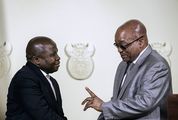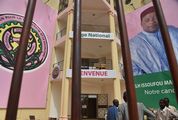ERIC Vemer is CEO of Group Five.
BUSINESS DAY TV: Group Five has had a pretty good first half, helped by its investments and concessions businesses, but it continues to face headwinds at its engineering and construction units.
Joining us on News Leader with more detail on that is CEO Eric Vemer. Eric ... so you’ve grown earnings in the first half and while there’s a low base effect to take into consideration here, to what extent have the numbers you’ve put on the table today reflected the kind of restructuring you’ve engineered in the business and (how) that’s now starting to pay off?
Eric Vemer: Yes, firstly I’d say that it’s a reflection of our strategy … in terms of the investments we’ve made in our concessions cluster as being a strong annuity business, which compensates for the secularity within the construction earnings. So the investments and concessions cluster was the key driver of earnings performance within this reporting period and that does reflect a strategy that we have set.
On the engineering and construction side, whilst a disappointing performance, as the management of Group Five we are comfortable with where that cluster is operationally. It’s really a reflection of the markets we’re trading in, very challenging conditions within SA. And, pleasingly, within engineering and construction we’ve seen good improvement in the contract loss-making ratio … which has improved significantly … that loss-making ratio is now back to what we would determine as a level of normality.
BDTV: Take us through the investment and concessions business. You are talking about toll roads here and in Eastern Europe — Poland and Hungary. And you also mentioned that you have got some new contracts in place as well, and great margin business compared with the rest of your businesses. How long are the contracts here? Are you going to see this annuity income going into perpetuity?
EV: Yes, the contracts are very long-term, so the projects that we have in Poland are secured through to 2040 and in Hungary they run through between 2032 and 2036. We do reflect, in our operations and maintenance order book, the value of those contracts but we are very conservative in how we disclose that order book in that we only look at it until the first review period. These long-term contracts, between every eight to 12 years, you do sit down with the client and review the terms of those contracts, just from a pricing perspective. So a very long-term secured order book.
We have a significant project on the A1 in Poland as well as two shorter-term operating contracts in Poland. And then we have three contracts in Hungary, one of which we were successful with our partners Aberdeen Asset Management in acquiring control of the M6 Phase 1 project in Hungary, in this reporting period and just before December, we financially closed that project. We as Group Five have a 12.7% equity interest in the project, but with that has come another long-term 10-year secured operations and maintenance contract.
BDTV: How much further are you looking to entrench your position within that part of the business? Because this is part of how you ride out the ebbs and flows of any economy right now, and certainly something that would halt your advantage is the kind of currency weakness we’ve seen in SA filter through.
EV: Yes, we’ve been established in Eastern Europe for something like 15 years now. It’s a long-cycle business so we have been pursuing and developing various other projects in other Eastern European markets, Czech Republic, Bulgaria, in Turkey and so on. But these projects typically do take somewhere between five and seven years to secure from the time that you bid until you have actually signed up the contracts, they’re financially closed. We as Group Five only come in as investor and operator, so we don’t do construction work on those projects in Eastern Europe and that’s again reflective of the countercyclical nature of those contracts.
We have also in this period, for the first time in many years, secured a new long-term contract beyond the one in the M6 in Hungary, we’ve also signed up a contract in Belfast, Northern Ireland, which is a new 20-year contract which we’ll be commencing to operate in this forthcoming period from April 1. So that’s quite a nice win for the business and that’s why you saw our operations and maintenance order book increase by more than 25% in this reporting period.
BDTV: Take us through your total order book — that’s down by 6%, R17.6bn at this stage. Are you taking on less local, low-margin business or are you just not getting more orders in?
EV: Firstly, it is a reflection of the fact that as Group Five moves forward with our strategy, we’re becoming much more of a developer and constructor of projects, which is very much driven by sector. So we have these deep sector relationships, technology partnerships in Africa around power, transport, airports and so forth, and thus the contracts that we secure tend to be much larger and they will be lumpy in nature. We had a big increase in the order book in the prior period on the back of the Kpone project awarded to us in Ghana, which was (about) R4.5bn.
But the pressure is really being felt in the domestic market, particularly within our civil engineering and projects business unit. Civil engineering is under a lot of pressure across all categories … including roads and earthworks. But the projects business — which has traditionally been a mine industrial sector servicing company doing structural mechanical electrical piping work as is reflective of the resources sector — as is reflective of the industrial sector, there’s very little work. So they’ve tended to now do subcontracting work within the energy environment to the power sector, which has put pressure on their margins as well as the volumes of their order book.
BDTV: Amidst all of that Group Five is still facing censure from the Competition Tribunal for alleged collusive tendering. You’ve said that any settlement on liability will be adequately covered, but has this ongoing battle influenced the way you’re doing business right now?
EV: I would say not, firstly from Group Five’s point of view we want to settle this thing and move on. We’ve not got any interest to extend it for any reason. At this stage the delays are really around the actual information that has to be disclosed to us in terms of the allegations made against the group. From our point of view we were a leader in the sector in terms of coming clean and disclosing all the information of what might have happened in the past. We went through a comprehensive process of ensuring that we shook the tree as hard as we could in the group to ensure that all the information our current and past employees might possibly have had in terms of any type of collusive practices, all that information came to light. But there could have always been information that either other competitors of ours or that the (Competition Commission itself) had found of which we were not aware. So from our point of view now we just want to see that information, deal with the facts, come to an amicable settlement in relation to those facts, and move on.
BDTV: Just finally, your cash balances are pretty strong, you’ve increased your dividend generously and yet you’ve cut your full-year capex. Are you taking a cautious approach here?
EV: The capex is really reflective of the unwinding order book within the domestic market. We have made a capital investment commitment within the manufacturing cluster, which is really in terms of bringing in new product lines within our dry building materials category in SA, which is quite exciting and which will create some jobs in manufacturing as well as protect some of the jobs. But for the balance it really reflects the declining levels of new order intake in SA.





















Login OR Join up TO COMMENT